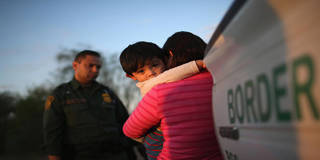To meet the complex challenges of the twenty-first century, the strengths and expertise of every level of government must be leveraged. That is why cities have emerged as leaders in the effort to tackle issues like climate change and migration.
ATHENS/KAMPALA/BRISTOL – After the 2009 United Nations Climate Change Conference in Copenhagen concluded without an agreement on climate action, mayors around the world developed their own innovative solutions. More recently, as national politicians have fomented false fears about refugees and immigrants, local leaders have taken responsibility for welcoming, protecting, and integrating millions of newcomers. When it comes to tackling the complex challenges of the twenty-first century, cities have emerged as leaders.
Past and current initiatives have made our cities stronger and more united, just as neglecting the challenges we face surely would have weakened and divided them. It has also given us important insights into what works best – insights that policymakers at the national and international levels would do well to take on board.
If we are to meet the challenges our world faces, we must capitalize on the strengths and expertise of every level of government. That is why, over the last two years, hundreds of cities have played an unprecedented role in developing two non-binding agreements: the Global Compact for Safe, Orderly, and Regular Migration and the Global Compact on Refugees.

ATHENS/KAMPALA/BRISTOL – After the 2009 United Nations Climate Change Conference in Copenhagen concluded without an agreement on climate action, mayors around the world developed their own innovative solutions. More recently, as national politicians have fomented false fears about refugees and immigrants, local leaders have taken responsibility for welcoming, protecting, and integrating millions of newcomers. When it comes to tackling the complex challenges of the twenty-first century, cities have emerged as leaders.
Past and current initiatives have made our cities stronger and more united, just as neglecting the challenges we face surely would have weakened and divided them. It has also given us important insights into what works best – insights that policymakers at the national and international levels would do well to take on board.
If we are to meet the challenges our world faces, we must capitalize on the strengths and expertise of every level of government. That is why, over the last two years, hundreds of cities have played an unprecedented role in developing two non-binding agreements: the Global Compact for Safe, Orderly, and Regular Migration and the Global Compact on Refugees.